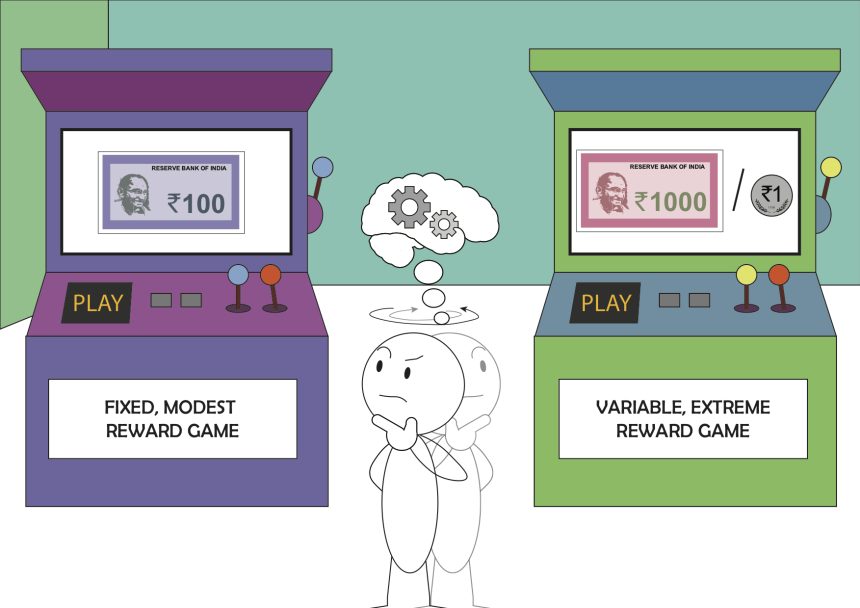Have you ever noticed how animals instinctively choose the ripest fruits in a tree? This behaviour, of seeking out the most rewarding option, offers a fascinating glimpse into the workings of the brain. Animals not only focus their attention on the most rewarding target (the location of the ripest fruit), but they also make a rapid decision to act on that information. Interestingly, the behavioural and neural mechanisms underlying this process are relatively underexplored.
Sridharan Devarajan, Associate Professor at the Centre for Neuroscience, Indian Institute of Science (IISc) and his PhD student Ankita Sengupta took up the task to investigate how the expectation of a reward influences attention. Their study in PLOS Biology offers fresh insights into this complex process.
Scientists have long known that the promise of a reward guides and dictates behaviour. People are quicker to detect changes, and respond faster and more accurately when they expect a reward. Many previous studies have investigated how the expectation of a reward influences attention and decision-making. But where they fell short is in differentiating whether these processes are governed by the same or different regions and processes in the brain.
To address this gap, Sridharan and Sengupta designed an experiment to examine how the expectation of a reward modulates the two key components of attention: sensitivity (the ability to visually identify the ripest fruit) and bias (the decision to act to pick out the ripest fruit). Researchers have often struggled to tease apart the impact of reward on sensitivity and bias.
Sridharan’s team conducted trials with 24 participants, each performing a two-part cognitive task. The first part tested for reward effects on sensitivity. The participant looks at a screen displaying two Gabor patches (smooth black-and-white stripes used in attention research), one on each side of the screen. After a very brief pause (200 milliseconds), the patches flicker, and one (or both) of the patch orientations might change. Participants have to report if they detected a change in one of the two patches. For each trial that they reported the change accurately, they received a monetary reward.
Here’s where the task got interesting. The researchers strategically rigged the rewards – the number of reward points was fixed on one side, whereas the points varied on the other side; in other words, it could be higher or lower than the fixed side. Participants would realise this during the task, based on the points received, leading them to focus on and be more sensitive to minute changes on the side that would get them greater rewards.
The second part tested for reward effects on bias. The only difference in this case was that the points for reporting a “Yes” option (deciding a change occurred), relative to a “No” option (deciding no change occurred) were varied on one side; as before, this reward could be higher or lower than the fixed side. Here, participants would be biased to choose the Yes option when it was more rewarding than the No option, and vice versa.
During the tasks, the researchers measured the participants’ eye movements and brain activity, and quantified the two components of attention.
In the first task, where sensitivity was being examined, participants paid more attention, and their gaze was drawn towards the side associated with greater rewards. “However, their decisional bias didn’t change, indicating that only sensitivity was modulated in this task,” explains Sridharan. Moreover, well-known brain signatures of attention, including electrical responses and oscillations, signalled higher sensitivity.
During the second part of the task, where bias was examined, the researchers observed that participants were more likely (biased) to choose the option (yes/no) with the higher expected reward. But during this task, the researchers were surprised to notice that none of the participants’ gaze or brain patterns matched those associated with attention. “Unexpectedly, changing bias did not result in any signatures specific to the attention centres in the brain,” says Sengupta.
The study’s results show, for the first time, that sensitivity and bias may be governed by separate neural mechanisms under the hood, each tuned differently by the anticipation of a reward. Moreover, while sensitivity seems to be closely linked to sensory attention centres, bias may be more closely linked to decision-making centres of the brain.
The study also has practical implications for understanding how we learn and make decisions in life. “Studies such as ours will help design tasks to understand risk-taking propensities in individuals, when faced with uncertain rewards. The findings may help to design treatments for addiction behaviours, such as gambling, which involve a complex interplay of reward, attention, and impulsive decisions,” adds Sridharan.
Source: Indian Institute of Science
Published on August 15, 2025


